Uncategorized
We Are All Part of the Safety Net
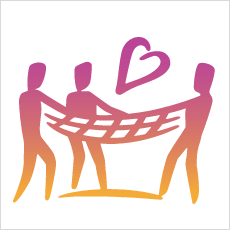
On Friday, April 15th of this year, we learned about the kind of community we have in Sunnyvale. That day, there was a three-alarm fire at the Twin Pines Manor Apartment complex. Our City’s Public Safety Officers immediately worked to save everyone’s life. The American Red Cross and City of Sunnyvale staff set up a temporary shelter at the Senior Center. But it soon became clear that the entire complex was declared unsafe, and 169 people became homeless.
Just three days after the fire, Sunnyvale Community Services took over case management for all of the families. We soon realized that 80% of the families earned low- to extremely low-incomes, and now they had lost their homes, and for many, all of their belongings.
Teamwork & Hard Work
Helping 70 families rebuild their lives was going to take tremendous resources. Funding from our City, our County, The Housing Trust, dozens of corporations, and hundreds of individuals flowed in to help the families. Local hotels gave discounted rates, nonprofits stepped up with transitional housing units, and dozens of landlords eased their lease requirements for fire victims.
Every part of our agency was tapped to help the fire victims, but we also had to keep our doors open for others in need of assistance. Monday morning was also “business as usual,” with our morning delivery of fresh produce from Second Harvest Food Bank, ready to be bagged and distributed to the 900 families who come every week for healthy food they otherwise cannot afford.
Dedicated SCS staff quickly outlined special procedures to help the Twin Pines Manor residents, and partner agencies including Downtown Streets Team, CSA Mountain View, and West Valley Community Services assigned staff to work alongside of SCS.
We are happy to report that all of the 70 families have moved into permanent housing. Thanks to helpful, compassionate landlords, half of the families have been able to stay in Sunnyvale.
The Twin Pines Manor fire was an unprecedented emergency for our community. But, in September we were faced with another emergency when an apartment fire on Gail Avenue left 46 people with no place to stay. Again, many of these families are low-income without the resources to easily start over. SCS is working closely with these fire victims, just as we did with the Twin Pines Manor fire victims. Outside of these “events,” every day families and seniors come to our door. They face financial emergencies as well as year-round food insecurity. Living on the edge, low-income families and seniors are one bill away from homelessness.
Sunnyvale has been described as a “big little town” where everyone is connected. Public officials, City staff, nonprofit partners, service clubs, faith communities, and many individuals all work together, making Sunnyvale truly the “Heart” of Silicon Valley.
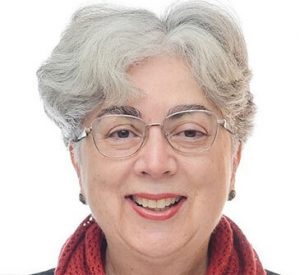 Marie Bernard
Marie Bernard
Executive Director, Sunnyvale Community Services
From Homeless to Hopeful
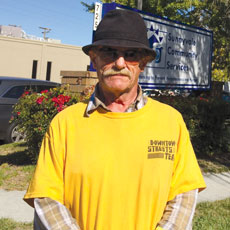
Two years ago, Patrick and Sandra had to move out of their Sunnyvale apartment when the rent went up more than 25 percent. For a while they tried staying in motels, but that was also too expensive, so eventually they set up camp in a local park in Sunnyvale. They officially became homeless on their wedding anniversary. “I served two tours of duty in the Air Force. I never thought my wife and I would be homeless,” said Patrick.
Patrick and Sandra had been living in the park for a month when Sunnyvale Community Services’ Case Manager David Hernandez approached them. Gradually, Patrick and Sandra trusted our staff. SCS provided food and sleeping bags and secured a motel voucher funded by Santa Clara County during the cold weather. With secure shelter, SCS helped the couple work on their goals to find stable housing. SCS linked them with Downtown Streets Team (DST). With DST helping the couple manage their appointments, SCS helped the couple find an affordable home. At every step, Patrick and Sandra consistently followed up with their case managers, filled out applications, went to meetings, and did everything they needed to do to secure an income and find a permanent home.
“I served two tours of duty in the Air Force. I never thought my wife and I would be homeless.”
Thanks to Patrick’s veteran status, SCS enrolled the couple in the new Supportive Services for Veteran Families (SSVF) program funded by the Veterans Administration. SCS staff was with them when they signed their lease and walked over the threshold of their new home.
Patrick and Sandra are still active with SCS. The couple signed up for the senior food program and “Challenge Diabetes,” a wrap-around program through a partnership with El Camino Hospital District and Second Harvest Food Bank that helps people like Patrick prevent or manage diabetes.
Now that Patrick and Sandra have a home, they are doing what they can to give back. “Now it’s time for me to help others—it’s their turn now—people who are just like me who need a little help,” he said.
We are grateful to the community for your continued support and generosity.
 Marie Bernard
Marie Bernard
Executive Director, Sunnyvale Community Services
No Child Dreams of Being Homeless…

People living on low incomes are juggling all the time.
It doesn’t seem possible, it doesn’t seem fair that any child is without a safe place to live, but it’s happening here in Sunnyvale. Children and their families are living in cars and teens are “couch surfing” by crashing with friends or relatives. Two or three families crowd into unheated garages.
This summer, we are gearing up for our “Head to Toe” program for Sunnyvale school children. We plan to distribute over 1,300 filled backpacks and $25 gift cards for new shoes, and more than 2,500 bags of extra food to help fill the growing summer food gap when schools are closed. Our goal is that every child in Sunnyvale will get supplies and shoes so they are ready to learn.
No child wants to worry about where they will sleep every night.
When children and their families come for backpack day, we ask the kids what they like to study at school. We love to hear them tell us about what they want to be when they “grow up.” We have budding dancers, fire fighters, doctors, professional soccer players, chefs, and computer programmers. Many of them want to take care of their parents and sisters and brothers. They are the future of Sunnyvale.
None of them dreams about being homeless. No child wants to worry about where they will sleep every night.
We wish we could report that our numbers are shrinking, that there is less need here in the Valley of Heart’s Delight. Sadly, many families have left because of the high cost of housing. For the families still trying to make it here, the need is deeper and constant. Families working in the service industry and in jobs without benefits face an everyday battle to stay housed, with utilities turned on and food on the table.
Thankfully, our community has always shown a commitment to help the most needy in Sunnyvale. We are truly grateful for your continued support. Together we can work to prevent homelessness and hunger.
 Marie Bernard
Marie Bernard
Executive Director, Sunnyvale Community Services
Tough Choices

People living on low incomes are juggling all the time.
According to Second Harvest Food Bank, 62% of low-income clients have to choose between food and housing—sadly, food often gets left off the table.
Hourly workers in jobs without paid sick leave come to SCS for one-time rental assistance when they are ill and don’t get paid. Some of the households we help include multiple families sharing a one-bedroom apartment.
SCS is the safety net in Sunnyvale.
When we give financial aid, our caseworkers always complete a 3-month budget with clients, helping them plan out their spending. Often a family will have to use 80% of their take-home pay for rent, leaving little for everyday expenses. We help with car repairs for homeless couples living in their cars, and partner with Sunnyvale Schools to supply backpacks and shoe gift cards for homeless students from kindergarten to high school.
Helping budgets go farther
Besides emergency financial aid, a family of four can receive $308 worth of nutritious food every month at SCS, helping them stretch their incomes to pay for rent, utilities, medical bills, and other necessities. Our weekly produce bags are filled with 25-30 pounds of a wide selection of fresh fruits and vegetables. Our monthly food bags are brimming with beans, peanut butter, tuna, and other protein items. This Thanksgiving, our families receive extra healthy foods, and in December each family can select a two-week supply of nutritious foods plus holiday gifts.
Last year, we again helped nearly 7,000 individuals with food or financial aid. Our total financial aid increased by 3% to $876,825. Thanks to our community’s support, we continue to help every eligible client. We prevented evictions and utility shut-offs for hundreds of families, paid medical bills for seniors, and provided support through workshops, activities, and referrals. Our lean staff, 900+ amazing volunteers, and YOU make it all work here in Sunnyvale. Thank you for your generosity and support!
 Marie Bernard
Marie Bernard
Executive Director, Sunnyvale Community Services
Raising Sunnyvale’s Bottom Line!

Sunnyvale Community Services and community leaders have come together to support raising the minimum wage in Sunnyvale. The proposed ordinance will increase the minimum wage for workers in Sunnyvale to $10.15/hour, matching the minimum wage in San Jose, with increases tied to the annual Consumer Price Index. Sunnyvale City Council will vote on the planned ordinance in the coming months. If approved, the ordinance will make Sunnyvale the third Bay Area city, after San Jose and San Francisco, with a local minimum wage.
This is great news for low-income workers and for Sunnyvale’s economy!
At $10.15/hour, a full-time worker making minimum wage in Sunnyvale can earn $21,112.00 per year before taxes. This is above the new California State minimum wage of $9.00/hour effective July 1st.
The new minimum wage can’t come too soon for low-income workers. Average “fair market” rents in Sunnyvale are now $2,129 a month. Rents in Sunnyvale went up 40% in just three years! Housing Trust Silicon Valley calculated that it takes more than three current minimum wage jobs to afford housing and other basic needs in Santa Clara County.* One worker would have to work 155 hours a week, 52 weeks a year (no vacation, no time off for illness) to afford the current fair market rents in Silicon Valley. That leaves just 13 hours a week to sleep!
With rents this high, food becomes a luxury for low-wage earners. Many minimum wage earners participate in the weekly produce and monthly food programs at Sunnyvale Community Services.
Rents in Sunnyvale went up 40% in just three years!
The local increase from $9.00 to $10.15/hour can mean $184 more gross income every month for a full-time job. What can a Sunnyvale family do with that much money? After paying their taxes, the working poor have to spend it—right away—in the local community. Any increase in pay will go towards rent, utilities, food, gas and car repairs, shoes for their children, and maybe even a needed dental exam. Their purchases will generate local sales tax revenues in our community. Most importantly, they will have a chance to live in the community in which they work and keep food on the table for their family.
We hope that our community will support a local ordinance to increase the minimum wage to $10.15/hour and tied to the Consumer Price Index. If you’d like to show your support, we encourage you to contact members of the Sunnyvale City Council and let them know you support increasing the minimum wage here in Sunnyvale!
Once again, Sunnyvale is living up to its name as the “heart” of Silicon Valley!
*Source: Housing Trust Silicon Valley
 Marie Bernard
Marie Bernard
Executive Director, Sunnyvale Community Services
What Recovery?

As Sunnyvale’s economy booms, something else is happening all around us—most people are getting poorer. The cost of living in Sunnyvale is skyrocketing, with average rents now over $2,000/month. But low-income workers and seniors living on fixed incomes have not received raises.
Federal Government Sequestration is slashing food and housing benefits for the most needy. The 2009 Recovery Act’s temporary boost to Food Stamps, known as the Supplemental Nutrition Assistance Program (SNAP), ended on November 1st. The Food Research and Action Center (FRAC) reports this equals an average benefit cut of $36/month for every SNAP household. This average cut of 5.5% per household will cause hardship for many families and seniors already stretched to the limit. Learn more at http://frac.org.
To make matters worse, Sequestration has meant increases in housing costs for thousands with Section 8 housing vouchers. Section 8 supplements housing for the most vulnerable in our community—the disabled, seniors, and the working poor. 17,000 households in Santa Clara County now face increased rents, at a time while other benefits are being slashed.
The cost of living in Sunnyvale is skyrocketing.
Our statistics tell a sad story. The escalating cost of living is forcing many families to leave Silicon Valley, while those who remain are falling into a widening income divide due to lack of affordable housing and a living wage. While the number of clients coming to our doors has plateaued, the need per capita has increased.
- Compared to five years ago, the amount of financial aid distributed by Sunnyvale Community Services for rent, utilities, and other financial emergencies increased by 39%.
- The amount of food we distributed to low-income families and seniors increased 104% in five years.
Until there is truly a recovery for all, we need your support. Thank you for being part of our work to prevent homelessness and hunger in Sunnyvale, the “heart” of Silicon Valley.
 Marie Bernard
Marie Bernard
Executive Director, Sunnyvale Community Services
Poverty that Spans the Generations
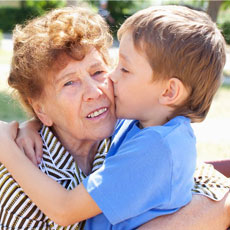
When the U.S. Census Bureau ranked all 50 states in the new “Supplemental Poverty Measure” last November, California had the highest poverty rate in the nation, with 23.5% of California residents living in poverty. According to the federal report, nearly 1 in 4 people cannot afford the basics of food, shelter, and health care in our state. The biggest reasons are the high cost of housing and childcare in California. In Sunnyvale, it is especially difficult to make ends meet with rents soaring and childcare costs out of reach for low-income workers. The poverty gap is widening for hard- working families and seniors living on fixed incomes.
At our agency, children make up more than 2 out of every 5 people we serve with food and financial aid every year. We are seeing more and more families spanning three generations who are living together to save money and help each other survive in Silicon Valley. It’s often clear that the children who come to our door are hungry, and their parents are weary from working two jobs with no benefits.
…the children who come to our door are hungry, and their parents are weary from working two jobs with no benefits.
We are a last resort for many of our clients, some of whom have already taken extreme measures by borrowing money from payday lenders. One of these payday loan victims was a woman who had retired and was receiving social security after working hard for many years. A few months ago, she was awarded custody of her one-year-old grandchild. When she assumed care of her grandchild, she suddenly had to buy food and diapers for the baby. Without additional income to cover these unplanned for expenses, she began to borrow from payday loan businesses. By the time she came to Sunnyvale Community Services, she had taken out six loans with high fees and interest rates amounting to over 400%. Thankfully Sunnyvale Community Services helped her with rental assistance, so that she could get off the payday loan merry-go-round. Our agency gave her diapers and emergency food, as well as budget counseling and referrals to other resources.
In partnership with the Coalition Against Payday Lending (CAPP), we are advocating against predatory loans that victimize low-income families and seniors. Thanks to community donations from people like you, we are not only able to provide financial support to families in need, but we are also able to give diapers and baby food to parents and grandparents caring for young children. During the summer months, our “Kids Summer Food” program is a vital resource for children out of school who are missing the free or reduced meals that school provides.
Thank you for helping the most vulnerable in our community. Your support is why Sunnyvale is the “heart” of Silicon Valley! You can read more about the Census report here.
 Marie Bernard
Marie Bernard
Executive Director, Sunnyvale Community Services
Getting Real

The Need in Sunnyvale is Greater Than Ever
People don’t usually associate Sunnyvale with poverty or people in need, but these figures prove otherwise.
- We helped 6,981 of our neighbors last year with food or financial aid, equal to 5% of the population of Sunnyvale.
- 96% of our clients have extremely low to low incomes, making under 200% of the federal poverty levels.
- Sunnyvale rents have increased 34% in just two years! Average Sunnyvale rental figures as of June: (source: RealFacts Online)
- 1 Bedroom apartment: $1,792, (up from $1,323 in 2010)
- 2 Bedroom apartment: $1,924 (up from $1,492 in 2010)
- The cost of food is rising dramatically, impacting everyone, especially families and seniors. In the past 6 months basic staples have skyrocketed: (source: Second Harvest Food Bank)
- Peanut butter is up 66%
- Rice is up 9%
- Eggs are up 7%
- Tuna is up 134%
- Beans are up 32%
- The Second Harvest Food Bank’s 2012 Hunger Index reports that this year, we continue to have 25% of residents in Santa Clara County at risk of hunger. Low-income households are being squeezed financially, with money spread thin across necessities like housing, clothing, and medical bills. Too often people have little money left for food, which means more food assistance is needed.
It’s a perfect storm for low-income families and seniors.
Unfortunately, a growing number of our neighbors are one bill away from homelessness. With rents and gas prices soaring, many low-wage employees can’t afford to live here or commute to work here. That means businesses and services in Sunnyvale will suffer.
Our slogan, “Our business is booming, and that’s not good!” is more true today than ever before!
With your help, SCS is here to help. Our city of Sunnyvale is truly the “heart” of Silicon Valley. With the generous support of our community, Sunnyvale Community Services will never turn away an eligible client who needs food or emergency financial assistance. Thank you for your continuing support of our mission to prevent homelessness and hunger!
 Marie Bernard
Marie Bernard
Executive Director, Sunnyvale Community Services
From Head to Toe
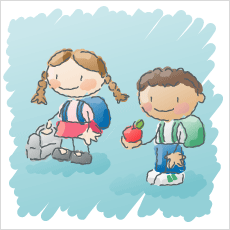
Help Sunnyvale Kids Be Ready for School
Did you know that when school is out, half of Sunnyvale’s school children are hungry? 47% of Sunnyvale’s children qualify for free or reduced school meals, and during the summer months, they miss the balanced nutrition they get during the school year. That’s why Sunnyvale Community Services is partnering with the Sunnyvale School District, Sunnyvale Rotary, and the Northwest YMCA to help all of our school children get the food they need this summer, and be ready for success in school this fall. Our community is working together to fill the gaps for food, backpacks, school supplies, and shoe vouchers for our children.
Sunnyvale Community Services has been helping families and seniors year-round since 1970—but we’ve never seen this explosion of need for our kids. Children make up 22% of the population of Sunnyvale, but they are 41% of the people we help at Sunnyvale Community Services.
A hungry child cannot learn. A child without the necessary school supplies cannot be prepared for school. A child with ill-fitting shoes cannot thrive and grow.
This summer Sunnyvale Community Services hopes to fill over 2,400 bags with kid-friendly foods in June, July, and August. We’re building a mountain of 1,100 backpacks and school supplies to distribute on August 16th. And, we are stretching our goals even further to have over 1,000 shoe vouchers so that children in Sunnyvale can be ready for school this year from Head to Toe!
A few years ago, we had to cut our shoe voucher program, due to funding cuts. But families and children still asked for them. So we started paying attention to the shoes of children who come to Sunnyvale Community Services—and that convinced us that we had to raise the funds to give every child a voucher for new shoes along with a filled backpack and a summer’s worth of kid-friendly food this year.
According to the California Budget Project report Playing with our Future, “Nearly one out of four California children lives in poverty, and many families—including single mothers and their children—continue to face economic uncertainty in the aftermath of the Great Recession.”
You can read more updates at http://www.cbp.org.
 Marie Bernard
Marie Bernard
Executive Director, Sunnyvale Community Services
One in Four are at Risk of Hunger

It’s rare for us to see starvation in our community, but hunger is all around us. Hunger means a child doesn’t eat breakfast, or a senior goes without dinner so they can fill their prescription. Workers making minimum wage look for 99-cent specials at fast food restaurants.
One in four people in Santa Clara County are at risk of hunger, according to the latest Hunger Study released by Second Harvest Food Bank. Day after day, our lobby is filling up with families and children coming in for financial assistance. The lines for seniors and families to pick up groceries are getting longer. For the past year, we’ve been distributing bread three mornings a week. When someone walks half a mile from the bus stop just to get a loaf of bread, you know they are hungry.
Last year, we received a record amount of food donations valued at $1.5M. But what is scary is that the amount of food we expect to receive this year is actually going down due to cutbacks in USDA food programs. SCS buys food to supplement donations we receive from Second Harvest Food Bank and community food drives. We purchase protein-rich foods such as peanut butter, “meals in a can,” and tuna. We’ve had to increase our food purchases by 9% in one year, as families come more frequently to our food pantry.
When someone walks half a mile from the bus stop just to get a loaf of bread, you know they are hungry.
How do you measure hunger?
The headlines are shocking. Poverty in California measured by national levels is at an 18- year high of 16.3%. That’s a family of four making less than $22,113 a year.
The Federal Poverty Level determines how government funding is allocated for many public programs such as Food Stamps. But it only measures the cost of a food basket to meet minimal nutritional needs, and doesn’t account for other costs such as rent, health care, or transportation. Many low-income families in the Bay Area make too much according to the Federal Poverty Level, but they are hungry and struggling with bills every month.
A study released in October by the Insight Center for Community Economic Development showed that the costs of very basic needs—food, rent, utilities, child care, health care, transportation, and taxes—went up 18.9% over three years in the Bay Area. A family of four in the Bay Area now needs $83,640 a year to get by, while minimum wage is stagnant and unemployment persists. You can view the data online at www.insightcced.org.
SCS is working hard to meet the growing need for nutritious food and financial aid in our community. Thank you for your continued support as we work to help our families and seniors in need in Sunnyvale.
 Marie Bernard
Marie Bernard
Executive Director, Sunnyvale Community Services
